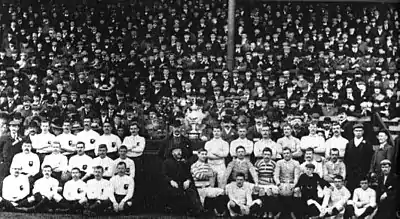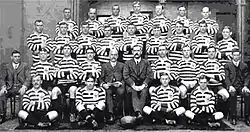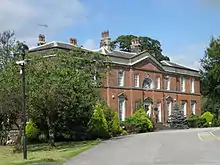Rugby league in the British Isles
Rugby league is played across England, Ireland, Scotland and Wales, but it's heartland in the North of England is where the sport is most popular, and is where the majority of professional clubs are based. The sport was first established in the George Hotel, Huddersfield, where 22 clubs from the Rugby Football Union split to form the Northern Rugby Football Union.
| Rugby league in the British Isles | |
|---|---|
 Pre-match at the 2017 Super League Grand Final | |
| Country | Great Britain and Ireland |
| Governing body | Rugby Football League (England)[lower-alpha 1] Scotland Rugby League (Scotland)[lower-alpha 2] Wales Rugby League (Wales)[lower-alpha 2] Rugby League Ireland (Ireland) |
| National team(s) | Great Britain men's team Great Britain women's team Teams of the Home Nations[lower-alpha 3] |
| First played | 1895 |
National competitions | |
Club competitions | |
Rugby league in the British Isles is discussed in the following articles, corresponding to the separate organisations governing the sport:
However, areas where the sport is similar between the Home Nations will be discussed in this article.
History

Rugby League was born in the British Isles, specifically at the George Hotel, Huddersfield in 1895 when the Northern Rugby Football Union broke away from the Rugby Football Union out of a desire to professionalise the game. This year gave birth to the first rugby league season where Manningham were crowned first ever Champions. However following this a national league would not be played until 1901 in favour of county's leagues In 1897, the Challenge Cup was formed which saw Batley win the first ever cup title. 1902 saw the county's leagues split into two tiers which were now being played in addition to the national league.
In 1904, the first ever international game was played in Wigan in front of 6,000 fans which saw England lose to Other Nationalities 9–3. In 1906, rugby league became a 13-a-side sport.
In 1907, the 1907–08 New Zealand rugby tour of Australia and Great Britain became the first tour of Great Britain by a forigne national side. This tour marked the first game of rugby league in the capital which saw Great Britain lose to New Zealand 18–6 at Stamford Bridge in front of 14,000 fans.
1921 saw the first £1,000 transfer of Harold Buck from Hunslet to Leeds.
The 1929 Challenge Cup Final was the first to be played at Wembley which saw Wigan beat Dewsbury 13–2 to lift their second Challenge Cup. Rugby League's first flood-lit game in 1932 was a friendly between Leeds and Wigan at White City Stadium in front of 10,000 people - Leeds won 18–9. In 1948, the first ever televised rugby league game was played. It was the 1948 Challenge Cup Final, which saw Wigan lift their third cup beating Bradford 8–3. The Rugby League International Federation was also formed this year in Bordeaux.
The 1949–50 Northern Rugby Football League season set the record for the highest total match day attendance in a season of 69.8 million - a record that still holds today. In 1954, at the 1954 Challenge Cup Final Replay, the record for the highest attended rugby league fixture was set at the Odsal Stadium with an official crowd of 102,569 watching Warrington claim an 8–4 victory over Halifax.
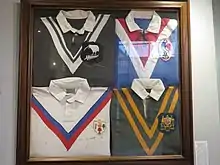
In 1954, the Rugby League World Cup was formed, 33 years ahead of the Rugby Union World Cup. The inaugural tournament was hosted in France and saw Great Britain beat the hosts in the final 16–12.
The 1960 Rugby League World Cup saw Great Britain as hosts for the first time. Great Britain won their second world cup title after losing out to Australia in the previous edition of the tournament.
In 1965, David Attenborough created the BBC2 Floodlit Trophy in order to promote the televising of rugby league. Four years later substitutes were permitted in matches, with the six-tackle rule being introduced in 1971. In 1972, Great Britain won their third, and most recent, world cup.
In 1976, the World Club Challenge was created which saw the league champions face Australia's league champions in what would become a yearly event. The inaugural competition saw Eastern Suburbs beat St Helens 25–2.
In 1981, Fulham R.L.F.C. formed from Fulham F.C. as part of its sporting family. They are currently the most successful team outside the heartlands. In 1983, yellow cards were introduced to the sport. Players reviving this card are subject to a 10-minute in game suspension. In 1991, the academy league was created in Great Britain.
The 1995 Rugby League World Cup marked the first time where Great Britain did not compete, instead competing as individual home nations of England, Scotland, Wales, and Ireland.
1996 saw the beginning of the Super League era where rugby league moved from a winter to summer sport. In 1998, the Super League Grand Final was created, reverting back to a play-off system to decide the league champions. This marked the end of the longest period of time where the league leaders were crowned champions which had been in place since 1973. In 2003, the League Leaders' Shield was first awarded as a physical trophy, with the league leaders from 1998 to 2002 also being recognised for their achievement.
In 2002, London Skolars became the first community team in over 80 years to progress to the professional structure, with 2006 seeing Catalans Dragons become the first overseas team compete in the league.
In 2007, Magic Weekend was introduced to the Super League, with the inaugural edition held at the Millennium Stadium in Cardiff. The event aiming to promote rugby league outside the heartlands. Following the 2007 season was the 2007 All Golds Tour which saw Great Britain compete for the final time - they won all three of their tour matches.
.jpg.webp)
The 2013 Rugby League World Cup Final at Old Trafford set the record for the largest attendance of an international rugby league game, with 74,468 people watching Australia beat New Zealand in the final.
2016 saw promotion and relegation return to British rugby league as the controversial Super League licensing was scrapped. 2017 saw the first trans-atlantic side in Toronto Wolfpack enter the British rugby league system in League 1.
The 2017 Rugby League World Cup was the closest a British side had come to winning the competition since 1972, with England losing 6–0 to Australia in the final.
2019 saw the return of Great Britain in the 2019 Great Britain Lions tour. The aim of the tour was to initiate a return for Great Britain to play competitively again, unfortunately they lost all four of their tour matches which caused people to question the feasibility of the team going forward.
August 2020 marked the 125th anniversary of the birth of rugby league, which saw the opening of the National Rugby League Museum at its birthplace at the George Hotel, Huddersfield.
Source: [1]
National team
Unlike in most team sports in the United Kingdom, the UK has historically operated on unified national side, nicknamed the GB Lions, since 1908.[2] The team saw great success, winning the 1954, 1960, and 1970 Rugby League World Cups in addition to achieving a runners up place on four separate occasions. However, the team failed to enter the 1995 tournament in favour of England, Scotland, Wales, and Ireland competing separately. Despite this, the GB Lions still competed in other tournaments together such as test series and the Rugby League Tri-Nations, until 2007 where the team was disbanded altogether.[2]
In 2019, the GB Lions were reunited for a tour of the Pacific, playing against New Zealand (twice), Tonga, and Papua New Guinea.[3] The presence of the tour gave hope for the home nations to compete under a unified team again.[2][3][4] However the fact that Great Britain lost all four tour matches called people to question the feasibility of the team, with a major criticism being the imbalance of English player to the other nationalities. This was defended with the justification of a lack of high level domestic league in Scotland, Wales, and Ireland.[5][6][7]
Women's team
Women's rugby league has also operated a full UK team nicknamed the GB Lionesses. Unlike the men's team, the women's team played in all competitions under the collective banner until the 2007 split in favour of the home nations competing individually. This allowed the team to compete in the inaugural 2000 Women's Rugby League World Cup, to which they were also hosts, which saw the team come second, losing to New Zealand in the final. The team played in the 2005 Women's Rugby League World Cup as their final major competition.
Domestic competitions
League system
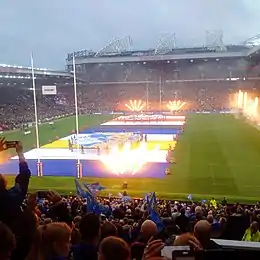
The league system in Great Britain has existed since 1895. Current the system operates a three-tier professional league system headed by the Super League, with the RFL Championship and RFL League 1 beneath the top tier. The professional structure is administered by the RFL,[8] with BARLA administering the fourth tier National Conference League and Conference League South in addition to various fifth tier regional leagues. Three of these regional leagues, the North Wales Conference and the South Wales Premiership, and the Scottish National League are administered by Wales Rugby League and Scotland Rugby League respectively as teams that compete in them are exclusively part of the respective home nation. Despite this, they are also recognised as BARLA regional leagues in order to allow promotion to the conference leagues via the same method as the English regional leagues. The British rugby league system however doesn't include Northern Ireland who compete with Ireland on an all-Ireland basis. The Irish top tier of Rugby League is the Ireland National League.
Popularity and team geography
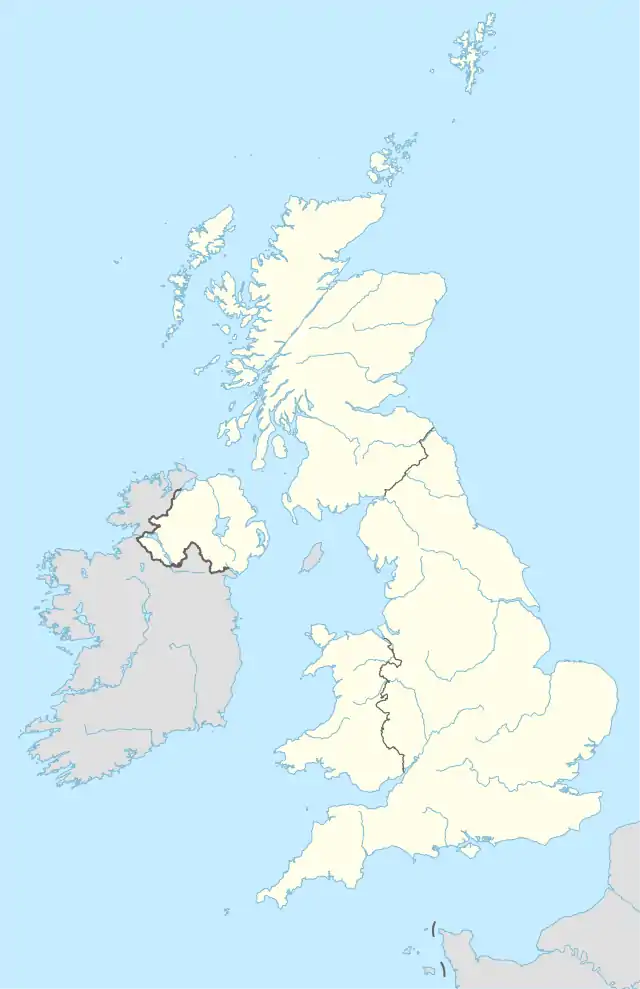
Due to the increased popularity of Rugby League in Yorkshire, Lancashire and Cumbria compared to the rest of the country, the majority of the 37 professional teams to make up the top three tiers are from this area of the country. Of the 34 professional British teams, only six are not from the two historical counties (four English, and two Welsh). The majority of professional clubs in Super League are based in the North of England except Catalans Dragons who are based in France. In the second tier Championship, London Broncos and Toulouse Olympique are the only clubs outside of Northern England and in the third tier League 1, Coventry Bears, London Skolars, North Wales Crusaders and West Wales Raiders are the only clubs outside Northern England, additionally Newcastle Thunder from the third tier aren't based in the rugby league heartlands.
The increased popularity of Rugby League in its heartland of Yorkshire and Lancashire sees the National Conference League primarily operate in the heartlands and the Conference League South operate elsewhere. The National Conference League is split into four tiers to reflect its increased competitivity as teams in this league are primarily looking for promotion to the professional structure whereas teams in the Conference League South are usually looking for a greater standard of Rugby League than what exists in the regional league.[9]
Due to the popularity of Rugby League in the heartlands of Yorkshire and Lancashire, the term "rugby" usually refers to rugby league in those regions whereas "rugby" usually refers to rugby union in the rest of the British Isles. Occasionally, in the heartlands, "football" also refers to rugby league however this is rare due to football being the most popular sport in the country.[10]
In terms of the general public, a 2005 report by MORI Sports Tracker reported that 15% of British over 15s had in interest in rugby league and 12% regularly viewed matches. These figures we're down from 20% and 15% respectively in their 1996 report.[11]
Cup Competitions
The Challenge Cup is the national cup of Rugby League in the United Kingdom. The competition is administered by the RFL and was instituted in 1896.[8] The competition has also seen teams from Ireland, France, Canada, Russia and Serbia compete.
The 1895 Cup also exists for teams competing in the Championship and League 1
Women's Rugby
The RFL also administer the Women's Super League and Women's Challenge Cup.[8]
Defunct competitions
There have been a number of rugby league competitions played in the British Isles during its history. The current Super League is the direct successor to the Rugby Football League Championship First Division during its rebrand in 1996, with the Second Division, and Third Division being rebranded to the Championship and League 1 respectively in 2003.
The 1895 Cup (2019–present) has also existed under different names at different points in history. Once as the Trans-Pennine Cup (1998–2001), as the Championship Cup (2002–2013), and again as the League 1 Cup (2015–2017).
The League Cup (1972–1996) and Charity Shield (1985–1996) have also existed for short periods of time and operated in the same way as the English football competitions of the same name. The League Cup being a cup for professional clubs only, and the Charity Shield a single game competition to mark the start of the season between the previous years league champions and challenge cup winners.
History, a major part of rugby league in the British Isles were the county competitions in Lancashire and Yorkshire. The RFL Lancashire League and RFL Yorkshire League are as old as the national league itself and the RFL Lancashire Cup and RFL Yorkshire Cup we're founded only a decade after the Challenge Cup. The county league were abandoned in 1970 and the cups in 1996 in order to develop rugby league nationally. The Rugby League War of the Roses was the only county competition to survive into the Super League era, being abandoned in 2003. The competition was a single game event featuring one team from each county and was based on the roses rivalry that has existed between the two counties since the Wars of the Roses which ended in 1487.
Governing bodies
Men's governance
The Rugby Football League (RFL) was the governing body for rugby league in the British Isles until the founding of Rugby League Ireland, Scotland Rugby League, Wales Rugby League, and in 1988, 1994, and 1995 respectively. Currently, the RFL has full control over Rugby League in England only with the other organisations operating within their respective home nation. However, the RFL has some powers over the two professional clubs in Wales, the North Wales Crusaders and West Wales Raiders as the RFL are the sole governors of the professional league system.
All four bodies are affiliated with the Rugby League International Federation (RLIF) and the Rugby League European Federation (RLEF), and government their own national teams with the RFL, Wales Rugby League, and Scotland Rugby League jointly operating the Great Britain national rugby league team.
The British Amateur Rugby League Association (BARLA) are responsible for amateur rugby league chiefly in the sport's North of England heartlands. Though many National Conference League and Conference League South teams are affiliated to BARLA, the Conference itself is not a BARLA organisation. As well as the conferences, BARLA overseas a number of regional leagues, mostly located in the heartlands, but also including the North Wales Conference and the South Wales Premiership, and the Scottish National League which are administered by Wales Rugby League and Scotland Rugby League respectively but also see BARLA involvement in order to allow promotion to the conferences.
BARLA are also responsible for selecting an international team consisting of amateur players, the BARLA Lions. This team tours many parts of the rugby league world, and have competed in the Rugby League Emerging Nations Tournament.
Women's Rugby
The Women's Amateur Rugby League Association (WARLA) is the governing body of female rugby league in the British Isles, it currently falls under the Rugby Football League association which oversees its running and management. It was originally established in 1985 and was recognised by the RFL in its first year.
Armed Forces
Rugby league was recognised as a military sport in 1994. The Combined Services Rugby League (CSRL) is the co-ordinating group for the Army Rugby League, Royal Navy Rugby League and the Royal Air Force Rugby League. Each constituent body organises its own competitions at unit and formation level. Players are fed into representative teams to represent each of the services, and the best players are selected to represent the Combined Services. Because of the difference in sovereignty between the United Kingdom and Republic of Ireland, it is the only place where Northern Ireland competes in rugby league under a UK system rather than an all-Ireland one.
Student Rugby
The British Universities and Colleges Sport run The University and College Rugby League and govern rugby league at the university level. The Champion Schools is the top level competition for secondary school children in Great Britain.
Rivalries
Domestic
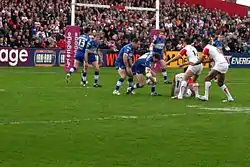
There are a number of rivalries within professional rugby in the British Isles, with debate about which one is the biggest. The Hull derby between Hull F.C. and Hull KR is the only derby where both participants are from the same city. The Good Friday derby is also considered a major rivalry with the two teams, Wigan Warriors and St Helens, consistently performing well in the league and cup competitions.[12] Other major rivalries include the Calder derby, Cheshire derby, and West Yorkshire derby.[13]
Additionally, there is a four-way rivalry between the so-called Super League Big Four. These four team are usually contain the champion of every season, both in the Super League and Challenge Cup. The Big Four consists of Wigan Warriors, St Helens, Leeds Rhinos, and Warrington Wolves. Prior to 2010, Bradford Bulls was considered a Big Four member, before the rise of Warrington, the club has since dropped in performance level and now plays in the Championship.
International
The England–Scotland football rivalry is the oldest, and by some sources, the greatest sporting rivalry on the planet,[14][15] due to this it has naturally become a rivalry in other sports. Because of the Great Britain national rugby league team, England and Scotland did not play their first game until 2016 Rugby League Four Nations[16] where England won 38–12.[17]
England (previously Great Britain as a whole) also has a fierce rivalry with Australia to whom they compete in The Ashes with.[18] This rivalry has also affected the domestic game with the Super League and National Rugby League becoming the two biggest club competitions on the planet with the two competition winners competing in the World Club Challenge. England also share a rivalry with New Zealand.
Tournaments hosted
Television rights
Live Super League and National Rugby League games are shown on Sky Sports Arena with highlights also being shown on the channel.[19][20] On Monday evenings, during the UK domestic season, the Super League Show is broadcast in the BBC regions of North East and Cumbria, North West, Yorkshire, and Yorkshire and Lincolnshire which shows highlights of the weekend's matches. There is a nation repeat on Tuesday lunchtime.[21] Challenge Cup matches are shown on BBC Sport. The final and semi-finals are shown usually on BBC One. Matches prior to the sixth round are usually shown on BBC Red Button or as BBC iPlayer exclusives. BBC Two is also used in addition to BBC One to show the matches from the latter stages of competition.[22]
Stadiums
.jpg.webp)
Ireland is the only home nation to have a national rugby league stadium, two in fact, with Irish home matches being played at Carlisle Grounds and Morton Stadium. England's home match are played at a number of locations, however, Wembley Stadium, Old Trafford, Olympic Park, and Elland Road are most commonly used. Scotland and Wales also don't have set home grounds. Netherdale has been the most recent home venue for Scotland and the Racecourse Ground for Wales.
Domestically, Old Trafford is used as the venue of the Super League Grand Final, with Wembley Stadium hosting the Challenge Cup Final. Super League's Magic Weekend has previously been hosted at the Millennium Stadium, Murrayfield, Etihad Stadium, St James' Park, and Anfield.
The KCOM Stadium, home of Hull F.C., is the largest club venue in the British Isles, following Bradford Bulls's relocation from the Odsal Stadium in 2019. The KCOM was also used to host the 2020 Super League Grand Final as Old Trafford couldn't accommodate that year due to the COVID-19 pandemic. Following this, the DW Stadium, Kirklees Stadium, and Headingley are the only other club venues to have a capacity greater than 20,000.
Museums
The UK's National Rugby League Museum opened in August 2020 in the George Hotel, Huddersfield, Yorkshire, the birth place of rugby league, on the sport's 125th anniversary.[23]
Other versions played
- 7s and 9s: Rugby League played with 7 and 9 players per side respectively, more common among pub teams due to the greater ease of getting a full squad.
- Touch Rugby: A limited contact version of the sport where a tackle is made by placing two hands on the opponent.
- Wheelchair rugby league: Played by people in wheelchairs.
- Masters Rugby League: Rugby League with modified rules to make it more suitable for older players.
See also
Notes
- Historically has governed the whole of the UK, currently has limited presence in Scotland and Wales and Jointly administers the Great Britain national rugby league team.
- Jointly administers the Great Britain national rugby league team.
- England national rugby league team, England women's national rugby league team, Scotland national rugby league team, Scotland women's national rugby league team, Wales national rugby league team, Wales women's national rugby league team, Ireland national rugby league team, Ireland women's national rugby league team.
References
- https://www.rugby-league.com/the_rfl/about_the_rfl/history__heritage/key_dates__events
- https://www.ucfb.ac.uk/news/ucfb-news-hub/in-focus-the-great-britain-lions-and-the-future-of-representative-rugby-league/
- https://www.bbc.co.uk/sport/rugby-league/50167198
- https://www.scotlandrl.com/2019/03/04/gb-lions-to-return/
- https://amp.theguardian.com/sport/2019/nov/17/kevin-sinfield-great-britain-rugby-league-wayne-bennett-papua-new-guinea-new-zealand
- https://www.bbc.co.uk/sport/rugby-league/50446763
- https://amp.theguardian.com/sport/no-helmets-required/2019/nov/12/great-britain-lions-coach-wayne-bennett-new-zealand
- https://www.rugby-league.com/the_rfl/about_the_rfl
- https://www.rugby-league.com/article/54086/rfl-launches-southern-conference-league-for-england-and-wales
- https://www.bbc.co.uk/voices/recordings/individual/leeds-leeds-collins-tony.shtml#transcript
- "MORI Sports Tracker 1996–2005" (PDF). Mori. 2005-03-01. Archived from the original (PDF) on 2007-09-27. Retrieved 2007-06-18.
- https://www.loverugbyleague.com/post/in-depth-the-st-helens-and-wigan-rivalry/
- http://sportofcall.co.uk/rugby-league/what-are-the-top-five-english-rugby-league-derbies/
- https://edition.cnn.com/2008/SPORT/football/11/06/first11.rivalries/index.html
- http://news.bbc.co.uk/1/hi/special_report/1999/11/99/battle_of_britain/473756.stm
- https://www.rugby-league.com/article/38842/england-v-scotland-the-oldest-rivalry
- https://www.rugbyleagueplanet.com/2013/03/02/2016-rugby-league-four-nations/%3famp
- https://www.sthelensreporter.co.uk/sport/rugby-league/rugby-league-ashes-rivalry-be-renewed-2020-2023750%3famp
- https://www.rugbyleagueontv.com/superleague
- https://www.rugbyleagueontv.com/nrlonsky
- https://www.bbc.co.uk/programmes/m000f1wn/episodes/guide
- https://www.rugbyleagueontv.com/challengecup
- https://www.bbc.co.uk/sport/rugby-league/53163130
External links
| Wikimedia Commons has media related to Rugby league in the United Kingdom. |
